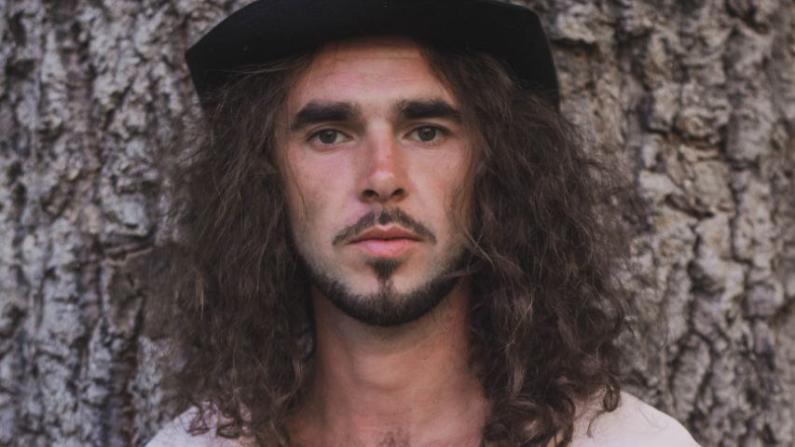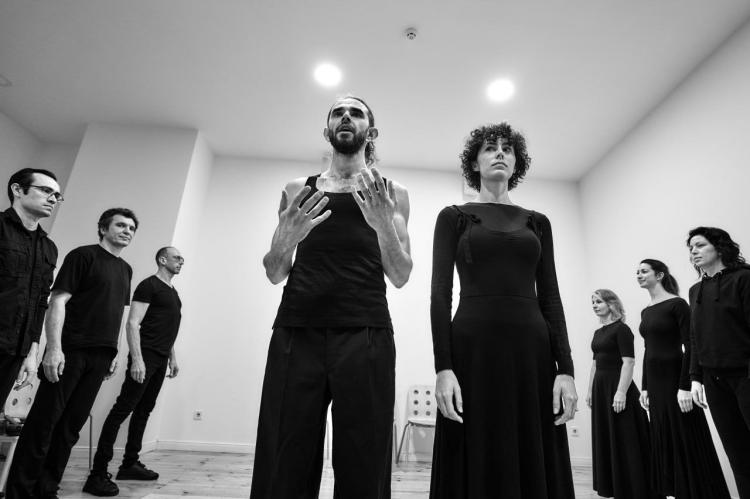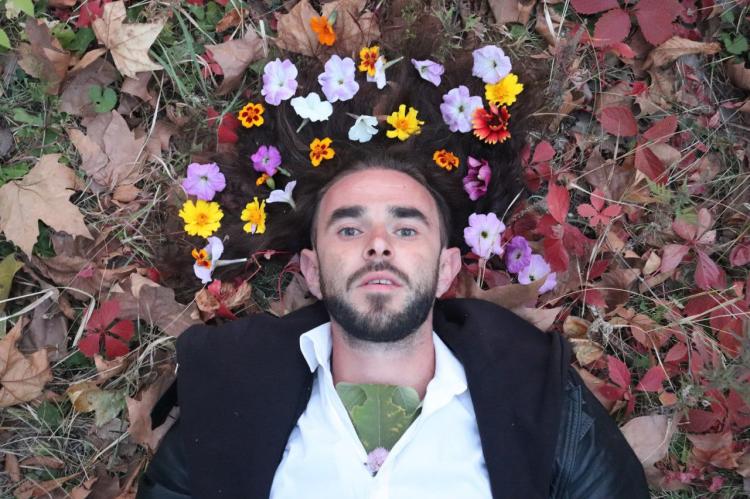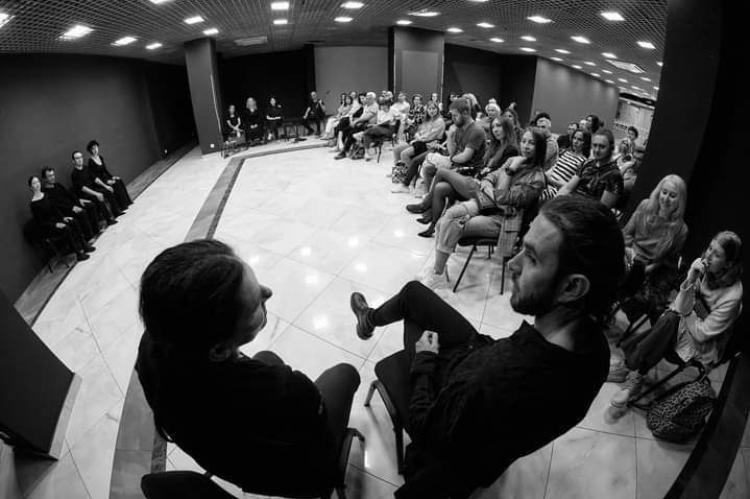
Dear Andrey, together with forumZFD and your colleague Marat Mairovich, you are currently working on a project called “Dream and Do: Healing with Art”. You are a theatre professional and performance artist yourself. What brought you into theatre and art?
Already as a child I was interested in art. I started painting when I was three years old. I grew up in Eastern Ukraine, in a city called Lysychansk. Today, this is occupied territory. When I entered school, I showed my paintings to the teacher – but she crossed over it with a red marker. It was my ‘childhood trauma’ (Andrey laughs). After this I stopped painting, but art continued to be my hobby, my safe space. During my university studies in engineering, I read a lot of books. One book that I took from the library was “Zarathustra” from Friedrich Nietzsche. That really triggered something in me, like an internal transformation. One morning, after I had completed my degree, I woke up and saw a whole life path in front of me: a normal job, two kids, a house… And I understood that I didn’t want this kind of life. The very same day I went to the railway station and decided that I would take the first train to one of the big cities in Ukraine. At 12 o’clock, there was a train to Odessa – so that is where I went. This was in 2009. Since then, I have been living and working in Odessa.
In Odessa, you studied clinical psychology and worked as a therapist for several years. But you also started to play theatre. How did that happen?
I tried to find something new in my life again, and participated in a workshop on Playback Theatre. Afterwards me and other participants kept on meeting and performing together. I noticed how this made me happy: I always left the rehearsals with an uplifted mood. After a couple of years, I felt the energy and readiness to teach, and I founded my own theatre. I also became a member of the Ukrainian School of Playback, and we went to different cities in Ukraine to teach playback theatre. In addition, I started engaging in performance art, in the tradition of Marina Abramovich, and also played contemporary theatre. My hobby had become my profession!
What connects art and theatre with peacebuilding?
I will answer this way: The artist is not the one showing where to go but the one who is located on the boundary between two counterpoints. For example, the boundary between light and darkness, between good and bad… I have been reflecting a lot on the mission of an artist, and I think that the mission is to stay at this boundary and to feel and experience the multiple levels of what is happening, to feel the vibrations between the two polarities. Like art, peacebuilding for me means to be on the boundary and to the feel the tensions from all sides. This can feel like an impasse. I have experienced this in real life, for example at the last presidential elections: I did not want to vote for either candidate, but there was no third option on the ballot paper. It was a deadlock! But we can use this to create art: I did some theatre performances to express my thoughts. It was my way to say something about it. These methods can also be employed in peacebuilding: With playback theatre we create spaces to share experiences and stories, and to talk about conflict, political situations and other topics. We create universes from inner stories, and we create peace between each other. Yes, I think it is about peacebuilding. Did I answer your question?
Yes, thank you! This is also what you do with the project “Dream and Do”: You employ playback theatre as a method for peacebuilding. Can you tell us more about how this project was born?
In the last years, my colleague Marat and I already worked with online playback theatre. After 24th February this year, we began to meet more regularly. Ada from forumZFD visited one of our meetings and suggested that we become partners. Together we developed the concept for “Dream and Do”. As the title says: We dream, and then we try to do something new. It is a very simple idea, but for me it is also a very deep idea, especially for Ukrainians in our situation. In the 1990s, the German philosopher Jürgen Habermas developed the concept of spaces for quality communication: We meet and something new is born. In these spaces, you don’t push people in any direction, and you don’t expect anything special from them. You just accept them as they are. Our project is based on this idea.
What happens in the online sessions?
Within the project, we have two formats of online meetings. The first format is called “One and a Half Rooms in War”. These meetings take place on Sundays and are structured in two parts. First, we have some guests, for example an interesting speaker, a musician or a playback theatre team. Afterwards we do playback theatre: Someone from the audience tells a story, and then the actors turn this story into a short art performance. It can be a theatre play or other creative performances, such poetry. Sometimes we make a song out of the story and sometimes we even paint it. We have started to explore new forms of expression which we didn’t use in playback practice before. We have up to 40 participants in these meetings. Most of them come from the playback community. They are all Ukrainian, but some of them now live in different countries.
And what about the second format?
This is called “Playback Club”, and the meetings take place on Fridays. We don’t play theatre here. It is more like a training or a discussion club. We usually have smaller groups with maximum 10 people, because it is a very personal space. Some participants are from the playback community, but not all. The meetings are open to anyone who wants to join. Some participants have heard about the meetings from their family or friends, and some learn about it on our Social Media channels.
How do you choose the topics for the sessions?
The topics are different every week. We try to sense what is happening with the people in that moment, and what topics they are interested in. For example, in the format “One and a Half Room” we had guests who spoke about emotional and psychological health, or about how to deal with information and propaganda. In some sessions we just meditated. Sometimes we invite international theatre professionals to come and teach, for example about how the techniques of clowns can help to deal with crisis situations. And one time we invited former playbackers who are now serving in the army. In the Playback Club, we also have different topics every week. For example, we have spoken about how we deal with conflicts on a personal level, and how we can preserve and regain our inner strength.
When you do playback theatre, what kind of stories do the participants share?
It is difficult to say. There are so many. A lot of stories are about difficult choices: Should I stay in my native city or should I go away? Should I stay abroad or come back to Ukraine? Many stories are about people losing and re-finding themselves. And then there are a lot of stories about adaptation, both in Ukraine and abroad. Observations about how our lives are changing. For example, in the last session one woman told how she misses the view from her window in autumn. She is from Dnipro, but now she lives California, where it is always summer.
How is the atmosphere like in the online meetings?
I think people have a feeling of togetherness, a feeling of “we”. It almost feels like sitting around a table at home. The regularity of the meeting gives stability and safety: Many people come every week and they know what to expect. Marat and I use the methods of playback theatre to create a space in which people feel safe and heard, and we listen very carefully to their stories. Marat is also a very good musician and he can influence the atmosphere with music. Some of the stories are very difficult of course, or even deal with trauma. But the participants feel that they can talk about it. And when the actors start playing, it can happen that trauma magically transforms into a piece of art.
How important is the support of forumZFD for the project?
First of all, forumZFD paid attention to what we are doing. This shows appreciation of our work, and it feels like we are connected to the international sphere. The financial support is very important as well, because it allows me to devote myself fully to this project and also to other forms of art. I don’t have to look for other jobs. What we appreciate very much about forumZFD is that it does not push us to do this or that – they trust us to take our own way. Also on the personal level we have a very good connection to the project managers Ada and Sveta. That supports us very much.
In a previous project which was conducted before the Russian attack in February 2022, you have organized joint online meetings for participants from Ukraine and from Russia. Now, this seems unthinkable. Do you see any chance that at some point in the future you will be able to hold joint again meetings?
In the first meetings after 24th February, we had both Russian and Ukrainian participants. But then we decided to invite only Ukrainians, because it had become very difficult for them to be in the same room with participants from Russia. This was a difficult decision for Marat and me. I have many friends in playback theatre who are from Russia. We even did a joint playback performance with actors from Ukraine, Russia and the occupied territories. This was at an international festival in Turkey this summer. I hope that one day we can start having conversations and dialogue again. But we cannot push Ukrainians to have this dialogue – this will only cause resistance.
Do you think art and theatre can help to heal the wounds of war?
Sometimes I have the feeling that everything is so complicated and nothing can help. Metaphorically speaking: If you climb a mountain and you can see the peak, then you know there is a way and you feel motivated. But we are like in a fog – we do not even see the mountain. And sometimes I think that what we are doing is not enough. There is a lot of material support for Ukraine, but not enough in terms of emotional and psychological support. When I speak with psychologists in Ukraine, I get the impression that nobody really knows what to do. However, in our meetings we hear the stories from participants, and we see how tears are transformed into a more joyful state of mind. And then I think that these meetings actually do something good for the participants.
Does that give you hope?
I don’t know whether it is hope (Andrey takes a long break to think about the question). It gives the feeling of being in contact, that we are in this together, that I am not alone. It is not exactly hope. It is love.
Background: Playback Theatre
Playback Theatre is a form of improvisation theatre. It was developed in the 1970s by the US-American Jonathan Fox and New Zealander Jo Salas. First, someone from the audience tells about a personal experience. Then the actors turn this story into a performance. Playback theatre can be employed in peacebuilding, for example to initiate changes of perspective in situations of conflict.


